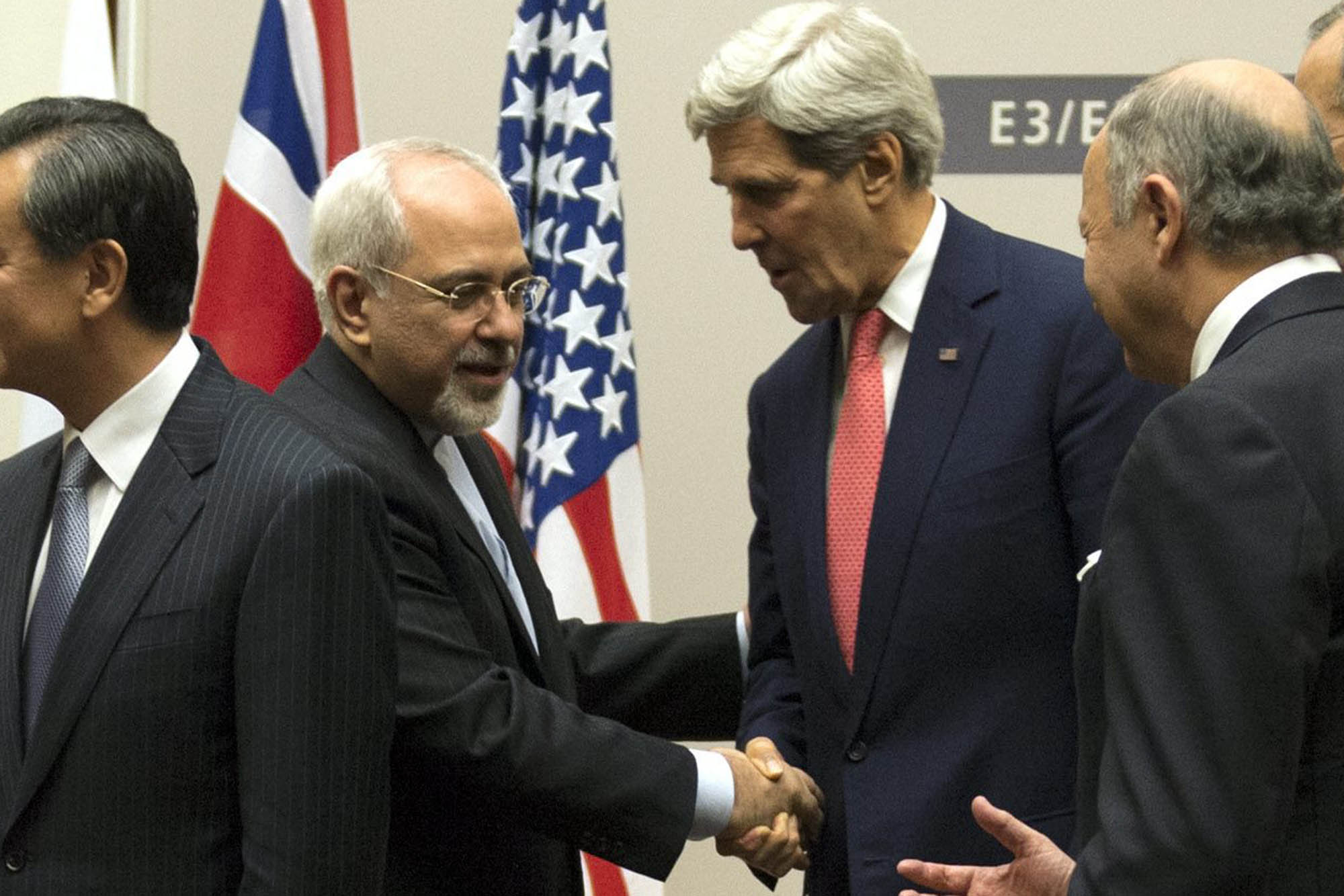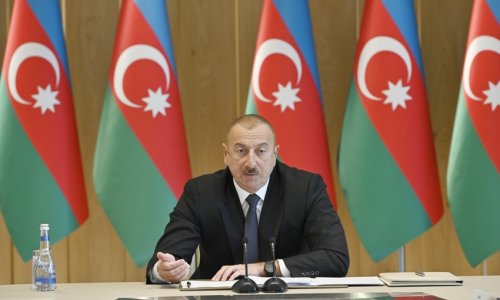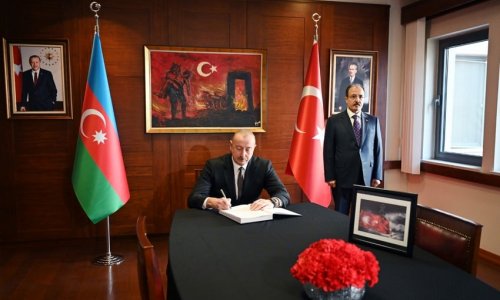By AURORA GANZ
As the Iran deal reshuffles the cards on the table, making ex foes potential partners and creating new commercial and political rivalries, states need to rethink their economic and political strategies. The agreement opens the door to opportunities for old and new partners, who see trade not only as a chance to increase their share of the market pie, but also to foster their ability to leverage and reshape the region’s balance of power. However, new winners may bring new losers, and the weak may become weaker. In this rush for gains, small countries have always tried to play safe. Tiny Azerbaijan offers a good example. Its strategic position has always been a double-edged sword: fortunate to have a direct access to the Caspian Sea and to lie on large oil and gas fields, Azerbaijan pays the price of sharing borders with two big countries, Russia and Iran.
In an ongoing effort to get rid of patronizing Moscow and Tehran, Azerbaijan has looked insistently to the West in an effort to gain the reputation of "bridge” towards Europe. Azerbaijan’s main trade partner is Brussels and its long-lasting partnership with NATO has been a stable axis of Baku’s foreign policy. However, Baku is not a Europeanist. It is not a new Ukraine or a new Georgia. It has no ambition to take a net distance from Moscow or Tehran. Its strategy can be defined as "multi-vector” policy, which has implied dealing with absolutely everyone: whether Europe, Russia, Iran, the US, Turkey or Israel.
At the crossroads of the east-west and north-south transportation corridors, Baku has succeeded in becoming the Eurasian Mecca for energy traders. Nowadays, Azerbaijan is the sole country in the region that extracts, refines, transports and negotiates its resources to the European market. In this sense, national resources have guaranteed not only economic growth and self-sufficiency, but also political independence.
How will the Iran’s deal affect Azerbaijan and its oil and gas policy?
Azerbaijan’s gas sector relies mainly on one giant field, Shah Deniz, which is currently producing around 9 bcm a year at its plateau level, but it is expected to increase by some 17 bcm, reaching a total of more than 26 bcm in just a couple of years. Also, Shah Deniz represents the sole major field development in the whole region. In 2012 Azeri proven oil reserves were estimated at 7 billion barrels.
The oil and gas industry has allowed Baku to maintain a flexible geopolitical posture, which overlooks the stark dichotomy that divides the region between the Western political and economic liberalism, and the Eurasian authoritarian regimes and clientelist oligarchies. IOCs and NOCs from US, Europe, China, India, Turkey and Russia have all invested in the Azeri energy industry and Baku has shown its eagerness to keep a dialogue with everyone, pursuing strategic independence while keeping its ties with competing powers. Unlike Georgia or Ukraine, Azerbaijan has been able to get closer to the West without repercussion from Moscow or Iran. However, it would be naïve to think that Azeri policy can drive regional and global trends. It would be more realistic to accept that Baku’s decisions are more of a product of regional patterns. Recent changes, further encouraged by the Iran deal, will undoubtedly affect the role of Azerbaijan and its relations with other actors.
After the collapse of the Soviet Union, Tehran’s ambitions of replacing Moscow in the Caspian failed, mainly due to the opposition of Washington in letting Tehran gain a major role in the region. Oil and gas played a key role in blocking Iranian expansion: the US government has for long opposed Iranian engagement in the Caspian oil and gas industry, imposing sanctions on companies that wanted to invest in the Iranian oil and gas sector, preventing Iran from growing and applying considerable pressure on neighbors not to do business with it. This objective was easily achieved, since almost all energy consortia partner with US companies, and are therefore subject to US law.
This stance showed clearly that for the U.S., in this context, political objectives took precedence over business opportunities. Russia in consequence gained a laissez-passer in the region and also improved its relations with Iran, especially in the name of the anti-American spirit that they share. However, the deal may change this situation, especially considering that the Ukraine crisis has harshened Moscow and Washington relations. A possible outcome is that these shifts could impact Moscow and Tehran’s mutual engagement in a region that both consider their backyard.
In this context, pipeline geopolitics deserve attention, not only because transport routes are key to deliver oil from the landlocked Caspian, but also because connecting states means connecting politics and interests. The importance of pipelines is still a critical topic nowadays and the deal may also have a role in further development of gas and oil transport routes. For Russia, Iran, Turkey and also any nation of the Caucasus and Central Asia, a pipeline through its territory means revenues and power.
Recently, the increasing antagonism between Russia and the West has raised concerns in Brussels over transport routes, especially in order to establish stable flows to Europe circumventing Moscow. Several projects have been discussed so far, but Iran was rarely part of the debates due to political reasons. While Iran was always sidelined because of the sanctions, routing through Iran would be indeed the easiest way to export oil from the Caspian Sea.
The most effective card Moscow had for long time was its monopoly of the pipeline system. In the late 90s, the opening of routes from Baku to the Mediterranean bypassing Russia challenged Moscow advantage. Existing pipelines follows three main routes: a northern route, the soviet Baku–Novorossiysk pipeline, which was the first to be built in 1997 and still transports Azeri oil to the Russian port Novorossiysk, on the Black Sea; a Western route, the Baku-Tbilisi-Supsa oil pipeline, a refurbished Soviet era pipeline which connects Azerbaijan to Georgia; and finally a Mediterranean route, which goes through the Baku-Tbilisi-Ceyhan oil pipeline and the south-Caucasus natural gas pipeline to Turkey, skirting both Russia and Iran, while reinforcing Turkey’s economy and importance.
In the aftermath of new relations with Iran, we can expect this situation to change. Without the restraints of Washington, energy policies are likely to revert to economic efficiency. Removing political barriers puts Iran back in the game. The agreement may give a new role to Iran also in EU’s energy security. The vivid ambition of stakeholders has already manifested itself through an enormous amount of projects that Western businessmen are promoting in Iran, the first of which would be Iran joining the planned TANAP and being able to export its natural gas directly to Western Europe.
Of course, these are only projections. Actual changes to the oil and gas transportation routes are not expected to take place any time soon. Similarly, Iran is not Iraq: there is no new field to be developed that could capsize the market. A prospect of an eventual flood of Iranian oil into global markets is not realistic, at least not in the short-medium term. Similarly, for the gas market. Iran holds the world’s second-largest gas reserves and it is world’s third biggest gas producer; however, the severe lack of infrastructure faced by Tehran is an enormous challenge for its export ambitions, since gas needs pipelines and terminals to be delivered. These investments require not only money, but also long-term commitments from customers, which at this stage are improbable. Nevertheless, the deal’s potential exerts an enormous effect on states’ behavior and geopolitical dynamics. In fact, even if the effects of the agreement may be only psychological, perception has a deep impact on political decisions.
In this scenario, Azerbaijan needs special consideration: it has definitively positioned itself as the economic engine of the South Caucasus and its oil and gas industry is the pivot of regional energy business. Similarly, its foreign policy makes it an interesting actor in the political arena: major powers share interests in the region, from Russia to Iran, China, the US and also Europe. So far, the Caucasus and Central Asia have been considered a space for free competition. From the Azeri perspective, the benefits of this situation come from a broad diversification in economic, political and security ties, which may even increase following the Lausanne agreement. The removal of sanctions on Iran comes at a time when sanctions on Russia are seriously damaging trade opportunities with Moscow. The drop in oil price and the collapse of the ruble created a contraction in the Russian economy that has had repercussions on its neighbors.
It is true that Baku has maintained a very balanced foreign policy, contrary to neighbors, like Georgia, which in the game of geopolitics have chosen sides. The Azeri Daily newspaper noted that "as the story goes in Azerbaijan, the death of one is compensated by the birth of another. Economically, any of the two turns in the foreign political course of the southern neighbor suits Baku”. There is, however, a strategic miscalculation in the idea that the identity of the regional main power does not change the rules of the game. The Lausanne deal gives Iran more room for maneuver and for engaging in a proactive foreign policy in the Caucasus, which could lead to important shifts in the geopolitical alignments of the region. If Iranian soft power increases, Moscow will not be silent. Unlike Moscow, Iran counts on strong historical, cultural and religious ties with Azerbaijan and its Shia-majority society; this gives Tehran the hope of imposing its Islamist political model over Baku.
Oil and gas have largely assured Baku freedom of choice in its foreign policy. However, the emergence of Iran and its new role in the global energy sector may diminish the effect of what has largely been Azerbaijan’s ace. Under certain scenarios, the Azeri multi-vector policy may not be sustainable, putting to test Baku’s energy policies calculus and obliging Azeri leadership to take a netter position in the international arena. For instance, Azerbaijan boasts the largest share of the strategic the Trans-Anatolian Natural Gas Pipeline project, which is expected to become the prime gas route to Europe. If Baku decides to engage more with Tehran, capitalizing on the trade opportunities offered by the new agreement, it may agree to deliver Iranian gas through TANAP. This decision will affect Gazprom‘s financial interests. Due to the blurry line between energy business and politics in the Caspian, the move will be perceived as a demonstration that Azerbaijan is taking distance from Moscow and provoke the Kremlin’s resentment.
In conclusion, the opportunities that the deal brings to Azerbaijan come with costs that may force Azeri leadership to look beyond energy and to find new strategies to reclaim the country’s role in the world. Since its independence, the two ruling presidents, the father and son Aliyev, have capitalized on the strategic global appeal of the Azeri energy industry to establish a wide portfolio of variegated friends and partners. However, although Baku has had the chance to pursue its own agenda without major obstacles, forthcoming geopolitical shifts force the country to downsize its international ambitions and to accept that energy resources solely are not enough to cement foreign policy decisions.
Aurora Ganz is a PhD candidate at the Department of Defence Studies of King's College in London.
www.ann.az
Follow us !











